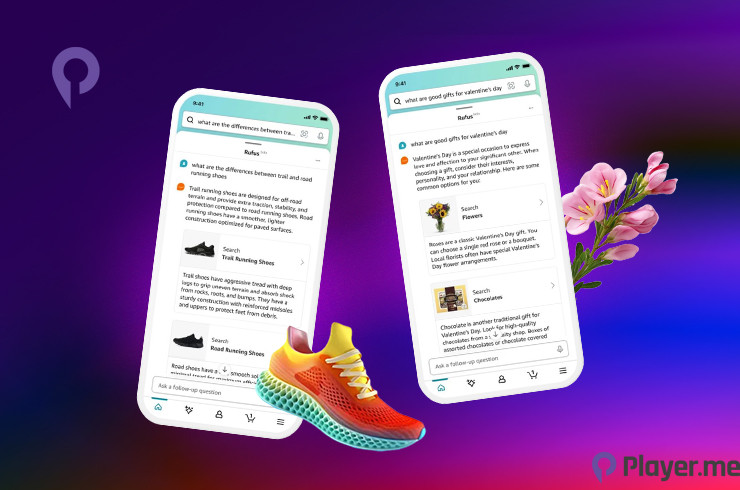In the ever-evolving landscape of e-commerce, Amazon once again takes centre stage with the introduction of Rufus, its latest innovation in the realm of artificial intelligence. Rufus is not just a chatbot; It’s a groundbreaking AI-powered shopping assistant designed to enhance the online shopping experience for users.
Unpacking Rufus: A Closer Look at Features and Functionality
At its core, Rufus is a generative AI assistant, meticulously trained on vast datasets encompassing Amazon’s product catalogue, customer reviews, community Q&As, and web information. Unlike conventional chatbots, it goes beyond simple interactions, aiming to guide and inform users about diverse product categories. From offering advice on purchasing a new TV to recommending camping gear, this AI assistant leverages its extensive training to provide personalised and relevant information.
The interaction with Rufus is seamless, primarily facilitated through the mobile app‘s search bar. Users can pose questions or seek recommendations, and the AI assistant taps into its training data to generate responses. The AI doesn’t replace the traditional search bar but rather enhances it, providing an additional layer of assistance for users who seek more personalised and informative shopping experiences.
Related: Amazon Q: Conduct New Business Interactions with Amazon’s Cool AI Assistant
Rollout and Availability: A Gradual Introduction to Rufus
As of now, Rufus is in beta, with a selective release to a small subset of Amazon’s mobile app users in the United States. This phased rollout allows Amazon to gather user feedback and fine-tune the AI assistant for optimal performance. The intention is to expand availability to a broader audience in the coming weeks, ensuring a controlled and iterative introduction to this innovative shopping assistant.
Rufus in the Competitive Landscape
@learnwithmyra What generative AI on Amazon with their new tool called Rufus. #ai #chatgpt #generativeai #tech #stem #learnwithmyra #shopping #amazon ♬ original sound – Learn with Myra
While Rufus represents Amazon’s foray into AI shopping assistance, it’s not the only player in the field. Other major retailers, such as Walmart, have also introduced their own generative AI shopping assistants. However, what sets this AI assistant apart is its thoughtful implementation, focusing on improving the user’s decision-making process rather than being driven solely by the hype surrounding AI technology.
Customer Interaction and User Experience
Amazon recognises the importance of a seamless user experience, and Rufus reflects this commitment. Users can expand the chat dialogue box, explore suggested questions, and ask follow-up queries within the chat interface. This conversational approach aims to make the shopping process more natural and user-friendly, eliminating the need for extensive web searches (You may consider reading on Arc Search for better online exploration and web search) before making a purchase decision.
Challenges and Future Enhancements
While Amazon acknowledges that AI assistants “Won’t always get it exactly right”, this transparency is a crucial aspect of their commitment to continuous improvement as we have discussed here. As Rufus evolves beyond its beta phase, users can expect enhancements and refinements based on real-world usage and feedback. The goal is to create an AI assistant that not only provides valuable information but also learns and adapts to user needs over time.
Strategic Importance in Amazon’s AI Initiatives

Rufus is not a standalone feature but part of Amazon’s broader strategy to accelerate its AI initiatives. Amazon CEO Andy Jassy‘s statement from the previous year, highlighting the company’s experimentation with AI across all business divisions, is reflected in the launch of this AI assistant. This strategic move positions Amazon at the forefront of integrating powerful conversational AI into the online shopping experience.
Industry Dynamics and Market Trends
Amazon’s introduction of Rufus aligns with broader industry trends where e-commerce giants and tech companies vie to integrate advanced conversational AI into their online platforms. The competitive landscape is evolving rapidly, and companies that harness the potential of AI-driven solutions stand to gain a significant edge in providing enhanced user experiences.
Our Final Say: Embracing Smarter Online Shopping with Rufus
As Rufus gradually makes its way to a broader audience, it marks a paradigm shift in how we approach online shopping. Amazon’s commitment to democratising AI is evident in this innovative assistant, aiming to empower users with knowledge and assistance. Whether you’re a tech enthusiast seeking the ideal microSD card or someone looking to revamp their workstation, it is poised to be the go-to AI shopping assistant, bridging the gap between information and decision-making.
In a world where technology continues to shape our daily lives, Amazon’s new AI assistant emerges as a beacon of intelligent assistance, promising a more personalised and informed online shopping journey. As this AI-powered shopping assistant takes place in the digital landscape, we believe we can anticipate a future where their queries are met with insightful responses, making AI assistants more reliable, more versatile, and more creative for various job scopes. Are you excited or anxious about the future of AI assistants? Will the workforce be replaced by AI assistants? Well, stick around in player.me to find out more.





